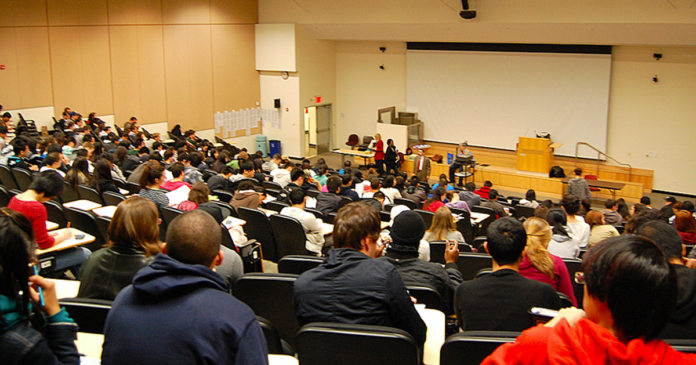A Canadian scholar is raising the alarm about a woke charter that has been signed by over 50 Canadian colleges and universities.
St. Mary’s Philosophy professor and former Society for Academic Freedom and Scholarship president Mark Mercer says the “Scarborough National Charter on anti-Black racism and Black Inclusion” will have “terrible consequences” on academia.
The charter was released in 2021 by an advisory committee that emerged from a 2020 virtual anti-black racism event hosted by the University of Toronto following the death of George Floyd and the rise of the Black Lives Matter (BLM) movement.
The 22-page document calls for post-secondary institutions to adopt principles of Black Flourishing, Inclusive Excellence, Mutuality, and Accountability when developing initiatives to “foster black inclusion.” The document also supports “Equity, Diversity and Inclusion” (EDI) ideology.
But in an Interview with True North, Mercer shared concerns about the Scarborough Charter, saying it is anti-academic. “It not only doesn’t promote the academic mission… but it subverts it.”
“(The charter) says that there are correct things to think about and correct ways to think about them, incorrect ways to think about them. That our ideas aren’t to be judged by their quality, that is whether they’re true or false, whether they solve problems or not, but rather their origin,” said Mercer.
“It seeks to impose burdens and controls on people who are attempting simply to think hard about the matters at hand.”
The BLM-inspired charter seeks to achieve its social justice agenda with “principle-based commitments to action” in governance, research, teaching, and learning.
At the governance level, it calls for equity across all leadership structures, revisions of dispute resolution and disciplinary processes, race based hiring in order to increase the number of black scholars, and the recruitment of more black students. It also calls for reassessments of campus security and safety procedures to ensure black dignity, understanding the existence of “technological inequities” and the creation of “anti-racism” offices.
At the research level, it calls for equitable research grants and “recognition practices for members of historically underrepresented communities bearing disproportionate burdens of the labour.” As well as race research clusters, and new reward systems that recognize contributions to “intersectional Black flourishing.” It also calls on research about or implicating black communities to respect “principles of co-construction.”
When it comes to teaching and learning, the charter calls for “affirming, accessible spaces” and naming practices “that foster Black belonging, knowledge development and sharing.” It also calls for the decentering of “epistemic Eurocentrism” in current curricula, and for more black studies programs. Furthermore, it calls for special scholarships, bursaries, fellowships for black students as well as “anti-racism” training for university staff and faculty.
As for Community Engagement, the charter calls for “inclusive task forces to conduct independent studies of the histories of slavery, colonialism and racial injustice, with a mandate to include recommendations that promote inclusive higher education and community flourishing into the future.” It also calls procurement processes to have “Black community prior-impact assessments.”
There are multiple elements of the Scarborough Charter that Mercer is concerned about, including the request that research on or implicating black communities respect “principles of co-construction.”
Mercer told True North the latter amounts to requiring black communities have a say on one’s research, which “undercuts the trustworthiness of university research.”
“If we’re not to draw certain conclusions, then we can’t trust that the conclusions that the research has drawn are accurate, are not biased, influenced by other things.”
Mercer is also concerned with how the charter wants to respond to anti-black racism on campuses. “The charter asks for more oversight and control, for expanding notions of harassment and disrespect,” he said, adding “that’s going to have terrible consequences for discussion and for intergroup, interpersonal relations.”
The institution Mercer teaches at, St. Mary’s University in Halifax, is a signatory of the Scarborough Charter.
He says he isn’t seeing the charter have impact yet due to the bureaucratic process that comes with implementing policy – but says that will likely change in the coming years.
“I think it’s coming. Many of the departments welcome it, and I think there have already been race-based hirings at St. Mary’s.”
Mercer also said he cannot find anything in the charter that he feels is beneficial to academia, and believes the EDI document does not benefit black students or scholars as academics.
“The main identity of anyone at a university, professor or student is an academic,” he added. “Those are the values and the concerns that one has at a university. The charter asks us to set aside our identity as academics in favour of other things, in favour of other goals, in favour of other purposes.”
“If you take the purpose of a university to be a place where there are synicures, special set asides for particular people to represent accurately some demographic or whatever, then perhaps (the charter is) serving its purpose,” he added.
In addition to promoting EDI ideology, the charter claims that there was slavery in Canada – despite the fact that slavery was abolished on the land that now is the Dominion of Canada in 1834 – 33 years before confederation.
Below is a list of the Canadian colleges and universities that have signed the Scarborough Charter.
Acadia University
Algoma University
Assiniboine Community College
Athabasca University
Bishop’s University
Brandon University
Brescia University College
Brock University
Carleton University
Centennial College
Concordia
Concordia University of Edmonton
Dalhousie University
Emily Carr University of Art and Design
Fanshawe College
Fleming
George Brown College
Kings University College
Kwantlen Polytechnic University
Massey College
McGill University
McMaster University
Memorial University
Mohawk College
Mount Royal University
Mount Saint Vincent University
Nipissing University NSCAD University
OCAD University
OntarioTech University
Queens University
Renison University College
St. Mary’s University
Simon Fraser University
St. Francis Xavier University
University of Alberta
University of British Columbia
University of Calgary
University of Guelph
University of King’s College
University of Lethbridge
University of Manitoba
University of Northern British Columbia
University of Ottawa
University of Prince Edward Island
University of Regina
University of Saskatchewan
University of St. Michael’s College
University of Toronto
University of Victoria
University Waterloo
University of Windsor
Western University
Laurier University
York University
The University of Winnipeg






















